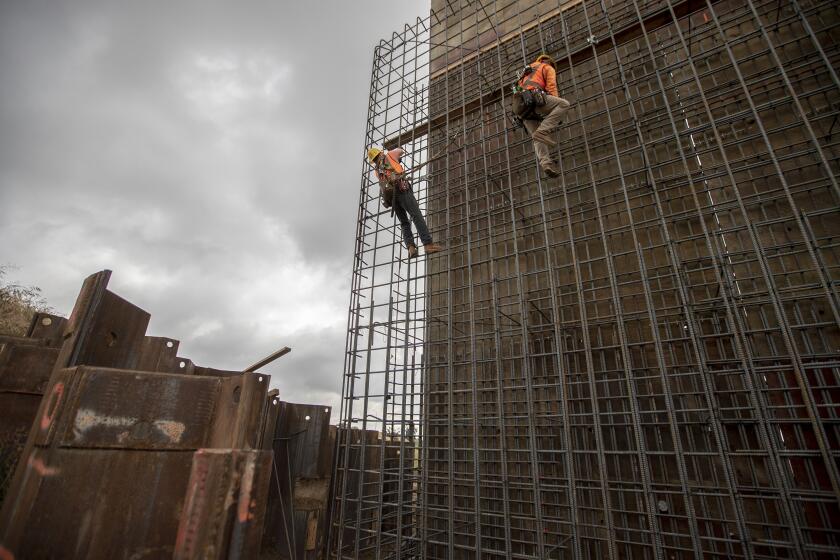California Assembly wants bullet train contract deferred in rebuke of project’s current plan
- Share via
In the strongest challenge to the California bullet train project in the past decade, a majority of the California Assembly has co-sponsored a resolution directing the state rail authority to defer awarding a contract this year to build a partial high speed system between Merced and Bakersfield.
The action this week comes amid growing concerns by lawmakers that Gov. Gavin Newsom’s plan to build the system for $20.4 billion will not deliver the greatest possible ridership and reductions in highway travel and greenhouse gas emissions.
The Assembly resolution does not signify that the Legislature as a whole wants the project changed, given that Senate President Pro Tem Toni Atkins (D-San Diego) has stayed silent on a proposal to shift funds from the Central Valley to the Bay Area and Southern California. Atkins and her staff did not immediately respond for comment Friday.
Nonetheless, it reveals that most of the Assembly is now ready to confront Newsom and the California High-Speed Rail Authority during a critical moment.
The rail authority plans to commit later this year to the largest contract award in its history to install 171 miles of track, an advanced signaling system and a high voltage electrical system, as well as an agreement for system maintenance over the next 30 years.
The resolution directs the authority to not issue the contract until the Legislature reviews the plan and appropriates the remaining $4.2 billion in funds from a 2008 bond issue approved by voters. The sponsors of the act say issuing the contract before the appropriation is contrary to the way state agenices normally operate and would bind the state to an agreement that lawmakers have not properly reviewed.
“The only remaining opportunity for the Legislature to weigh in on the direction of the high speed rail project occurs when [the rail authority] asks us for the remaining $4.2 billion in bond funds,” Jim Frazier (D-Discovery Bay), chairman of the Transportation Committee, said in a statement.
“We cannot allow HSRA, or any department, to enter into contracts that bind the Legislature’s approval of future appropriations. The Legislature’s role in approving the budget must be respected before key decisions on the state’s largest infrastructure project are made.”
Opponents of the state’s high-speed rail project say California is preparing to violate a 2008 ballot measure promise not to use state subsidies for operation of the bullet train. Proponents disagree.
The fight over the contract began last year when Assembly Speaker Anthony Rendon (D-Lakewood) backed a plan to delay installing an electrical system in the Central Valley and divert about $5 billion to future bullet train routes in Southern California and Bay Area that now carry commuter rail systems. The plan would shift initial service on the high speed tracks in the Central Valley to new low emission diesel trains that could travel all the way into Oakland or San Jose.
“It is important to make sure that the High-Speed Rail Authority does not close the door to options other than the one created by a small handful of bureaucrats and the unelected Authority board,” Rendon said in a statement. “The voters have been given no voice since 2008, and their elected representative, the Legislature, has had no vote since 2012.”
But rail authority chief executive Brian Kelly has strongly opposed that plan, backed by the state’s powerful construction unions. In a statement about the resolution, the rail authority only reiterated the need for the high speed rail project and said it looked forward to working with the Legislature.
Labor unions remain a powerful force in backing current planning for the project. Robbie Hunter, chief of the State Building and Construction Trades Council of California, said, “I am not an ideologue, but we need infrastructure in this state. It will improve the quality of life.”
But a growing number of Southern California members argue that diverting some of the money to the urban centers pays off in jobs and investments in commuter rail systems, which would yield larger ridership and stoke public enthusiasm for more rail investments.
Legislative staffers said they believe even more members will join the resolution when it is taken to vote. A number of Republicans joined in the bipartisan resolution, including Jim Patterson (R-Fresno) and Vince Fong (R-Bakersfield.)
The resolution does not carry the force of law to actually block the rail authority from issuing the contract. But if the rail authority rejects the advice, it sets up a potentially costly and historic battle.
Toward a more sustainable California
Get Boiling Point, our newsletter exploring climate change, energy and the environment, and become part of the conversation — and the solution.
You may occasionally receive promotional content from the Los Angeles Times.
If the rail authority were to issue the contract and then the Assembly not agree to appropriate the funds, the state could be on the hook for termination costs and end up with a project in disarray. Or the Assembly could be forced to appropriate the money to avoid those costs, backing what it now believes is a flawed plan.
The Legislature launched actual construction of the high speed rail project when it appropriated the first allotment of funds from the bonds in 2012. Even then it was a close and controversial decision, passing the Senate by a single vote when three key senators opposed the move and said the plan needed changes.
Since then, the project has faced delays and escalating costs, one reason some in the Legislature want to change course.
More to Read
Sign up for Essential California
The most important California stories and recommendations in your inbox every morning.
You may occasionally receive promotional content from the Los Angeles Times.












